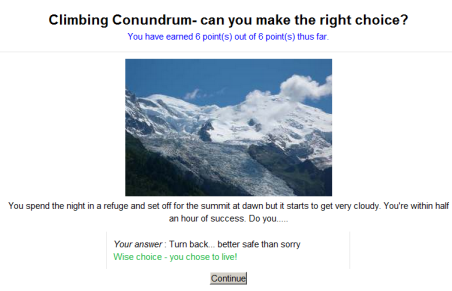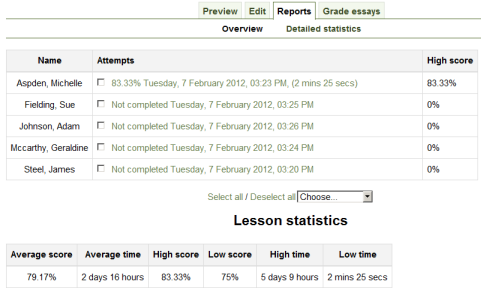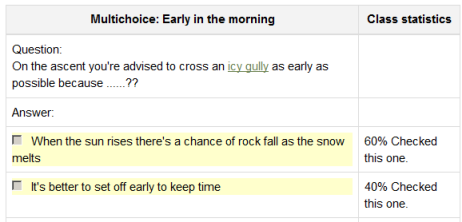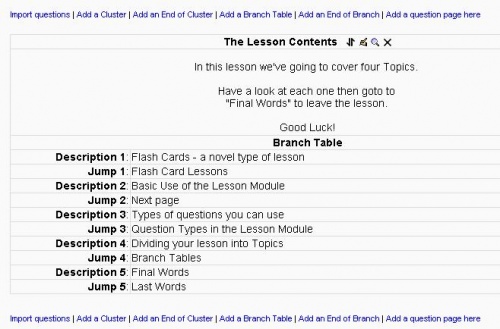Using Lesson: Difference between revisions
Mary Cooch (talk | contribs) |
Mary Cooch (talk | contribs) (→What the teacher sees: adding info) |
||
| Line 16: | Line 16: | ||
==What the teacher sees== | ==What the teacher sees== | ||
*A teacher clicking on a lesson will see tabs at the top offering them the chance to preview, edit, view reports or grade essays in the lesson: | |||
[[File:teacherviewoflesson.png]] | |||
====Preview==== | |||
*The lesson opens up in preview mode for the teacher. However, it will not show the score unless the teacher switches their role to a student. | |||
====Edit==== | |||
*The Edit tab allows teachers to alter the lesson once it has been set up. There are two views - Collapsed and Expanded. See [[Building lesson]] for more details on editing the lesson. | |||
====Reports==== | |||
*The reports tab shows the performance of students taking the lesson. There is a general "Overview" as in the following screenshot: | |||
[[File:lessonreportsoverview.png]] | |||
*Below the "Overview" can also be seen general statistics. | |||
*There are also more detailed reports on individual questions in "Detailed Statistics", as in the following screenshot: | |||
[[File:lessonreportsdetailed.png]] | |||
====Grade essays==== | |||
*Any essay questions which have been set in the lesson can be accessed and graded here. | |||
==Grading lessons== | ==Grading lessons== | ||
==Lesson reports== | ==Lesson reports== | ||
Revision as of 22:32, 18 February 2012
This page really needs improving. Please see the page comments for suggestions of what to include, then remove this template when you're done.
PLEASE NOTE: THIS IS WORK IN PROGRESS OVER NEXT FEW DAYS--Mary Cooch 20:08, 16 February 2012 (WST)
This page outlines how students and teachers interact with Moodle lessons once they have been created. For details on how to set up and then organise a lesson, see Lesson settings and Building Lesson
What the student sees
- A student clicking on a Lesson will see an introductory page with one or more buttons which they choose from to select the path they wish to take.
- The display may vary according to how the teacher has set up the lesson in Lesson settings. For example; there may or may not be a list of pages down the side; there may or may not be an ongoing score.
- Students progress through the lesson with either content pages (of information, which is not graded) or various types of question pages(which may be graded) When a question page is used, the following page gives the answer and feedback if offered:
- The lesson is ended when the student has met the criteria set by the teacher. This could be answering a certain number of questions correctly, accessing a certain number of pages with content (text, audio or video) or following a certain navigational path. A final page appears where the student can check their score, if applicable, and return to the main course page.
What the teacher sees
- A teacher clicking on a lesson will see tabs at the top offering them the chance to preview, edit, view reports or grade essays in the lesson:
Preview
- The lesson opens up in preview mode for the teacher. However, it will not show the score unless the teacher switches their role to a student.
Edit
- The Edit tab allows teachers to alter the lesson once it has been set up. There are two views - Collapsed and Expanded. See Building lesson for more details on editing the lesson.
Reports
- The reports tab shows the performance of students taking the lesson. There is a general "Overview" as in the following screenshot:
- Below the "Overview" can also be seen general statistics.
- There are also more detailed reports on individual questions in "Detailed Statistics", as in the following screenshot:
Grade essays
- Any essay questions which have been set in the lesson can be accessed and graded here.
Grading lessons
Lesson reports
Ideas for using Lessons
There are three main ways in which the teacher can view a lesson after the first page(s) has been added:
- Navigation view - Preview tab
- Expanded - Edit tab
- Collapsed - Edit tab
Navigational tabs for the teacher were added in Moodle 1.6 . The views can be selected by clicking on a tab.
Expanded Edit View
In the expanded view, the teacher sees the pages in the edit order. There is the page title, an edit or action bar, a view of the page content, and more information about the jumps.
The action bar next to the page title, allows the teacher to move, edit, preview or delete the page.
Here is a detail showing a single content (branch table) page.
Notice the blue links that repeat at the top bottom for page insertions. These separate every page in the expanded view.
Tree or collapsed view
In the collapsed view, the teacher sees the pages in edit order, with the page title, type of question and where the jumps will take the student. It also has some edit-action functions to the right. In either the collapsed or expanded edit view, the pages are presented what is called the edit (logical) order.
These action functions allow the teacher to move, edit, preview, delete or add a page type (pull down menu).
There are several ways a teacher can see how a lesson's navigation order "works" from a student's perspective. Remember that jumps make the Lesson module adaptive or individualize based upon a student's choices. Preview tab is a way to view some of the adaptive nature of compiled lesson. The Preview tab will start the lesson at the first page in the edit order. While there are exceptions, the lesson will then appear in the navigational order seen by students when they make a choice.
Another way to view the lesson is to click on the preview icon which is part of the action bar which is next to every page in the edit mode. This will start the lesson at that page.
- TIP: navigation view will often depend upon the choices the student makes. In lessons with more complicated structures, each student maybe presented with a different navigation view.
- TIP: If, in the lesson settings, the teacher has chosen to display the left menu, the student will see that menu on the left hand side. This menu is visible only when teacher is in the navigation view. The teacher sees if currently using the All pages view or the Tree view.
When the lesson has no content
When adding a new lesson activity to a course, Moodle will first ask the creator to decide on the settings of the lesson (see Lesson settings. Next Moodle will ask how you want to start editing your lesson. When in doubt, start by adding either a question page or content (branch table) page from the menu shown below.
- TIP: It is a good idea to first create the majority of a lesson's pages with content and/or questions page format. And then if desired, add jumps to those pages and then add navigational pages that create classic branches or clusters.
Settings > Lesson administration > Edit settings > Flow control group
Review of Flow control settings
In the Flow control group of settings, please note:
- "Allow student review" setting applies to the review of a whole Lesson, whereas
- "Provide option to try a question again" setting applies to the review of an individual question page. When the student does not select the correct answer, 'Provide option to try a question again" setting will display 2 buttons. One will direct the student back to the question and the other to continue.
- "Maximum number of attempts" is designed to prevent a student from being stuck on "This page" where they continually put or select the wrong answer. It will override other settings, such as review or the option to try the question again. When exceeded, it will not allow a score to be recorded for that question.
Case 1
The teacher wants the student to be able to attempt any question no more than 3 times and be given the chance to answer the question again. The teacher wants the student to see the response attached to their answer.
- Flow control settings
- Allow student reviewYes
- Provide option to try a question again No
- Maximum number of attempts 3
- Display default feedback No
- Number of pages to show 0
- Slideshow No
- Student selects wrong answer and will see:
- "Response for the wrong answer" (if any is shown)
- "Yes, I'd like to try again" button
- "Continue" button.
- Student selects correct answer and will see:
- "Response for the correct answer" (if any is shown)
- "Continue" button
Case 2
The teacher wants to allow the student 3 attempts at all questions but not see any feedback except the site default feedback for wrong answers.
- Flow control settings
- Allow student review No
- Provide option to try a question again Yes
- Maximum number of attempts 3
- Display default feedback No
- Number of pages to show 0
- Slideshow No
- Student selects wrong answer and will see:
- Not quite. Would you like to try again? as text over the
- "Yes, I'd like to try again" button
- '"No, I just want to go on to the next question" button
- Note: If the wrong answer jump is set to "This page" and the number of attempts is under the maximum, then the student will return to the question, regardless if they select "No, I just want to go on".
- Student selects correct answer and will see:
- "Your answer: {gives the student's answer)"
- Response attached to the correct answer (if any)
Case 3
"Speed bump for speed clickers". Teacher only wants the student to get once chance to record an answer on any question. They will will only see the response the teacher provides for any question, or the default feedback if no response has been set for the answer the student selected.
- Flow control settings
- Allow student reviewNo
- Provide option to try a question again No
- Maximum number of attempts 1
- Display default feedback Yes
- Number of pages to show 0
- Slideshow No
- Student selects wrong answer and will see:
- "Response for the wrong answer" (if any is shown)
- "Yes, I'd like to try again" button
- "Continue" button.
- Note: When teacher sets the Jump to "This page" for a wrong answer, they will return to the page but their score will not change.
- Student
- "Response for the correct answer" (if any is show)
- "Continue" button
Case 4
Example of Slideshow here
Case 5
Example of Unseen question here
See also
- Lesson samples down loadable and on line demonstrations of the Lesson module.
- Grades See how individuals and the class answered the questions (must not be a practice lesson)
- Creating a Decision-Making exercise (role play) using a Lesson
- Creating a Lesson video tutorial






